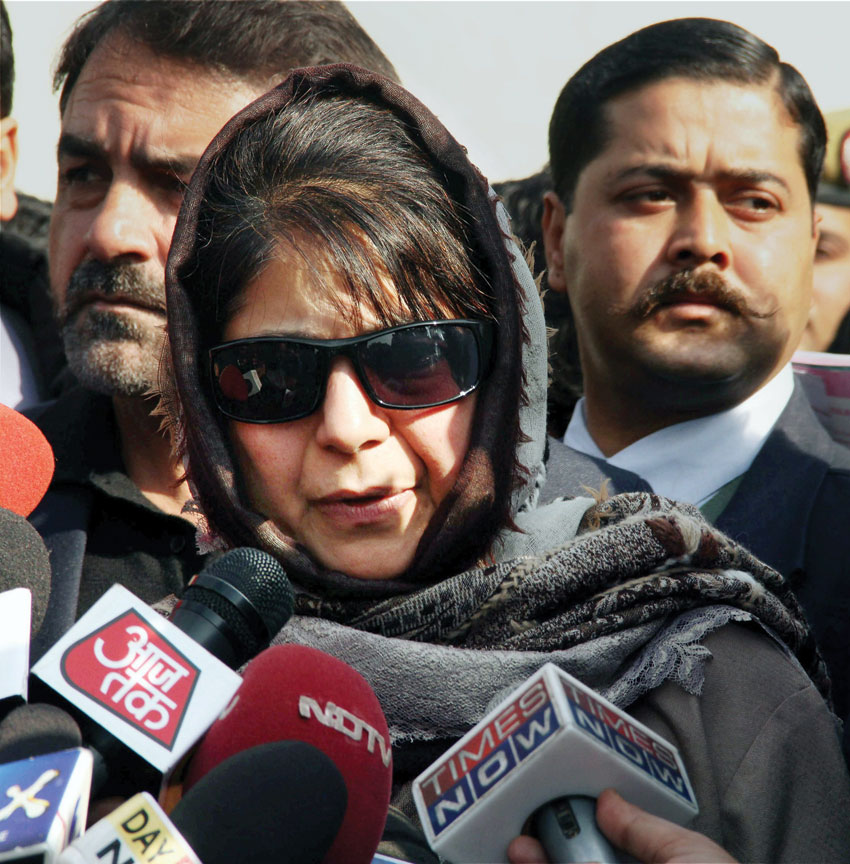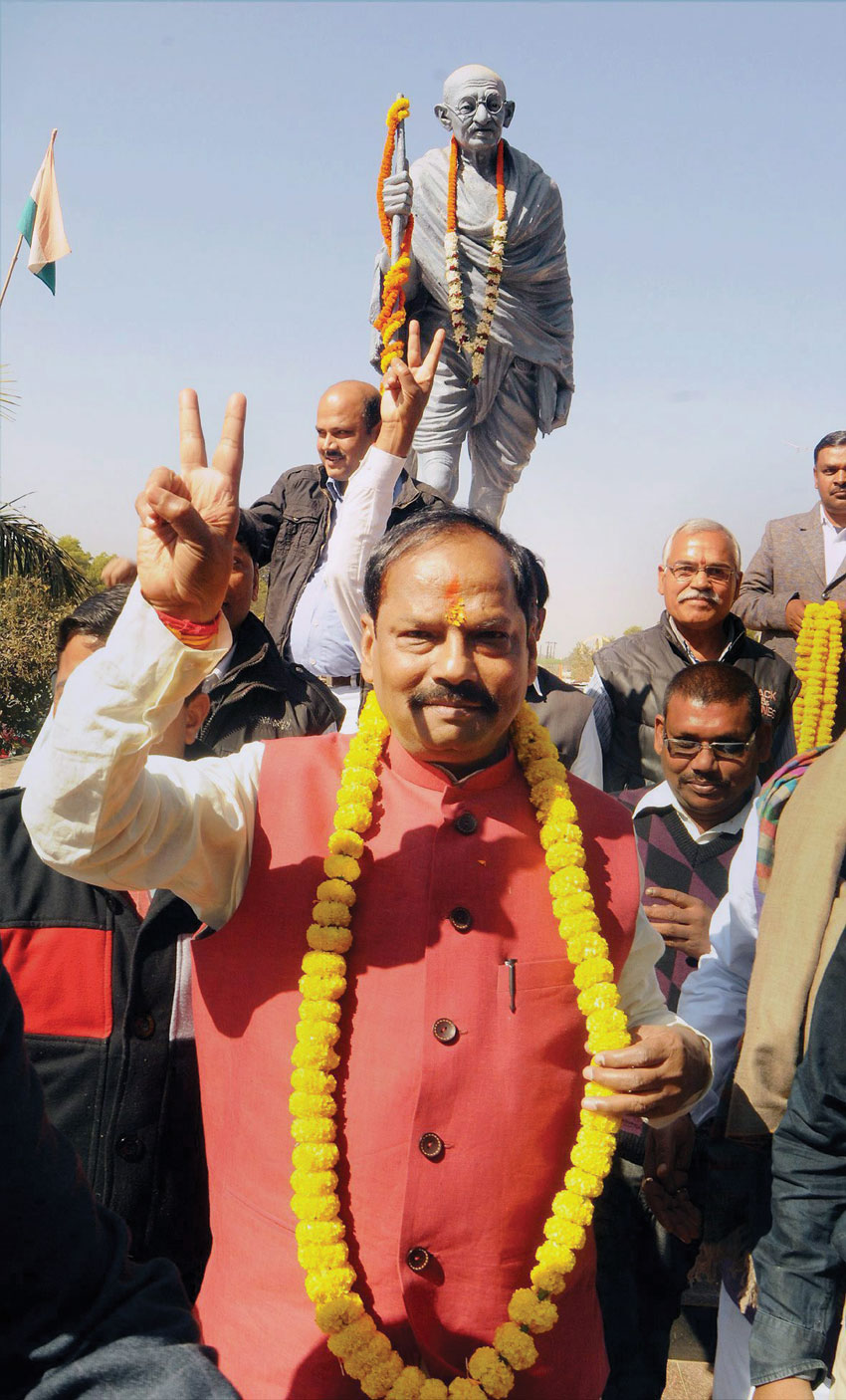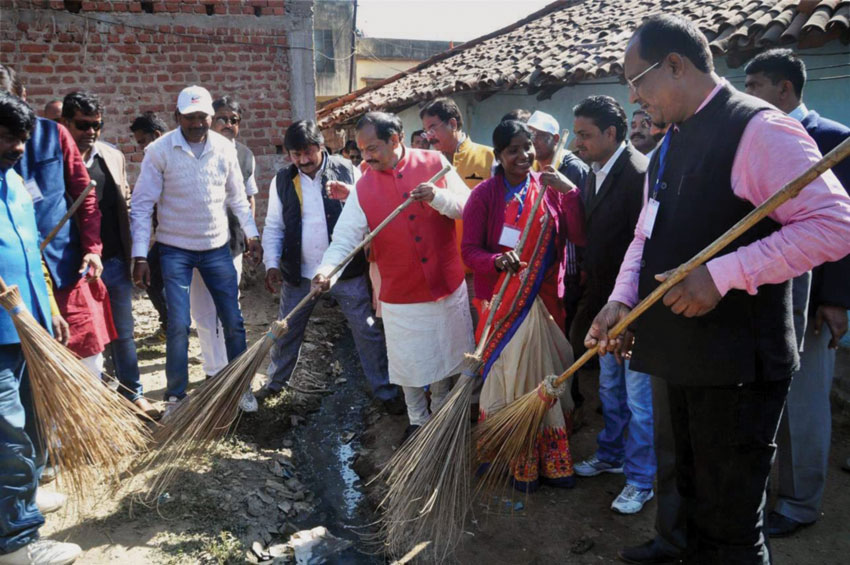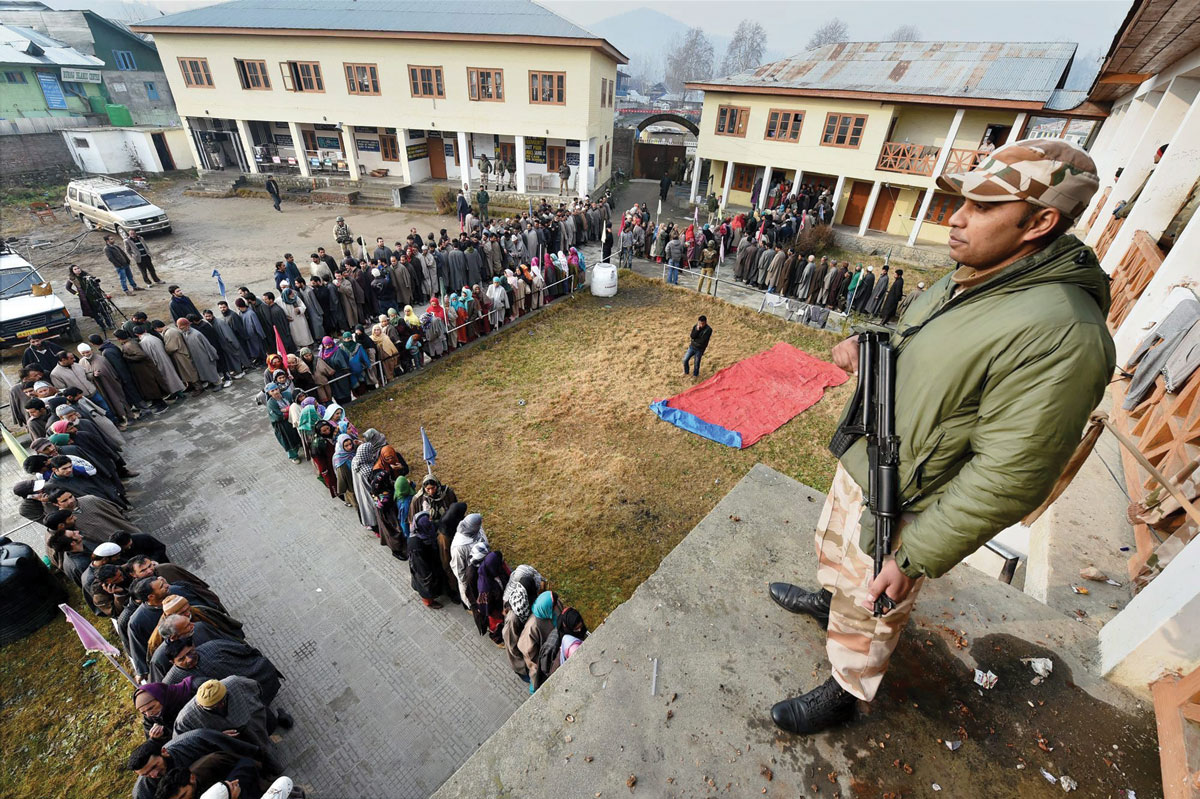MANDATES FOR TWO STATE ASSEMBLIES
A security jawan guards as voters wait in queues at a polling station to cast their votes for Assembly elections in Handwara district of Jammu and Kashmir. 18 assembly segments went to polling in the second phase of elections in the state in December, last year. (S. Irfan | PTI)
[divider type=”thin”]
Two Indian states, Jammu & Kashmir and Jharkhand registered a record 66 percent turnout of voters in the multi-cornered contests to their state assemblies. The five phase elections were spread over a month with massive security arrangements to prevent any sabotage by terrorist or Maoist elements, writes Priyanka Bhardwaj.
[divider type=”thin”]
India’s two provinces, Jammu & Kashmir and Jharkhand registered a record 66 percent turnout of voters in the multi-cornered contests to their provincial assemblies. The five phase elections were spread over a month with massive security arrangements to prevent any sabotage by terrorist or Maoist elements.
Jammu & Kashmir
The December 2014 verdict in the country’s Northernmost and only Muslim-majority province of Jammu & Kashmir was pronounced a fractured one.
Out of a total of 87 seats, various political parties garnered – 28 seats by the Peoples Democratic Party (PDP), led by Mufti Mohammad Saeed; 25 by the Bharatiya Janata Party (BJP); 15 by the National Conference (NC), led by Omar Abdullah (outgoing Chief Minister); 12 by the Congress; and 8 by other parties.
None of the parties received a majority and the PDP achieved the first rank, with major gains in the Muslim dominated Valley of Kashmir.
Most obviously the virtual rout of the NC flowed from an anti-incumbency factor and the failure of the ruling dispensation in leading relief operations during the province’s worst floods, also declared a national calamity.

Government formation therefore depends on possible mergers among the assortment of parties who are already grappling with options and preferences, and putting their feelers into action.
Speaking to Siliconeer, Yuvraj Vikramaditya Singh, son of former Sadar-e-Riyasat, Dr. Karan Singh, who was contesting from the province from the PDP said, “We (the PDP) have not done as well as we had hoped. But we still are number one.”
As PDP leader Mehbooba Mufti elaborates, “The verdict is certainly below our expectations and our party is in no hurry to cobble together a government. It will take time to explore possibilities to meet the people’s expectations of good governance. It is difficult to say when it (government) will materialize.”
The Congress has declared its intentions of allying with the PDP as it had done in the past.
Another possible coupling of the PDP could be with the NC, its staunch rival.
A drubbed Abdullah surprised one and all with his mention of a “possible alliance” with the PDP, though he sounded more circumspect, albeit a “99 percent no,” on any such thing with the BJP.
Abdullah, who has led his party with 28 seats in 2008 elections, could manage a win only from Beerwah this time.
For the BJP, the commendable forward movement of doubling its share of seats in the state legislature reasons can be attributed to the energized, power packed campaigns of Prime Minister Narendra Modi and the party’s stupendous victory in the Lok Sabha Elections held in May, last year.
With its improved performance in the Hindu-majority Jammu region, the BJP might also hinder its partnership with a regional party that may be deriving its strength from the Muslim vote bank, for fear of hurting Hindu sentiments.
Yet keenly aware of its relevance in the king making process in the province, BJP President Amit Shah has announced that the party is keeping all three options open — of forming the government, supporting another party and being part of a government led by another party.
Inferring from past records of government formations a probable scenario could also be the PDP, the BJP and People’s Conference entering into a power sharing calculus.
An alternative framework could be the PDP receiving outside support of the Congress and a few independents, with an intention to keep the BJP out of the government and to which end Saeed could avail his previous Congress-stint to full effect.
The combine of BJP, People’s Conference and the NC, with options of permanent or rotating Chief Ministerships and Deputy Chief Ministerships being accorded to leaders from these three parties, is another workable recourse.
Jharkhand
The forest and mineral-rich province, popularly known as the “Ruhr of India” and having a history of fourteen years of President’s rule and hung assemblies in 2005 and 2009 elections, witnessed the saffron color spreading its reach as voters came out to exercise their franchise despite Maoist or Naxal threats for a clear and stable government formation.
The BJP won an absolute mandate by capturing 43 seats along with its ally All Jharkhand Students’ Union (AJSU) out of a total of 81, while the Jharkhand Multi Morcha (JMM) headed by outgoing Chief Minister Hemant Soren won 19 seats, Jharkhand Vikas Morcha (JVM) took up 8 seats, and the Congress stood last with the “Others,” managing just about 6 seats each.

Alongside celebrations happening in full swing at 11 Ashoka Road party headquarters in New Delhi, Shah said, “2014 has been a year of unprecedented success for BJP. It was our promise to give full majority government to Jharkhand, and I assure the people of Jharkhand that the party will deliver good governance.”
Modi’s pitch for a stable government, development and good governance for the province in nine rallies and Sangh Parivar’s diligent groundwork in non-tribal and tribal areas most probably wielded the magic wand to produce the success figures.
Also the confusion created by Congress’s annulment of its partnership with the JMM on the eve of the elections could have added more to the kitty of seats originally aimed at by the BJP.
Just as the BJP’s stellar win is no surprise, the defeat of the Congress is symptomatic of a long drawn incapability of the party to weld coalitions both at the national and provincial levels, and in countering the Modi wave.
A perfect verdict for the BJP in fact is only expected to translate into speedy promulgation of its economic development agenda which further means expedition of mining projects in the mineral rich province.
Two former speakers of the state assembly, C.P. Singh (from Ranchi) of BJP, and Alamgir Alam won their respective constituencies and the current Speaker Shashank Sekhar Bhokta (of JMM) lost from his turf, Sarath Assembly seat.

Surprisingly tribal leaders were largely trounced — Hemant Soren lost from Dumka though he won from Barhait constituency, BJP’s Arjun Munda lost from Kharsawan constituency, Babulal Marandi of JVM (P) lost from Giridih, and Madhu Koda of Jai Bharat Samata Party, also tainted in the mining scam, lost from Majhgao constituency.
The province with a mixed population of tribals, non-tribal locals and settler-population has had five tribal Chief Ministers — Marandi, Munda (thrice), Shibu Soren (thrice), Koda (once) and Hemant Soren (once and incumbent) in the past.
So the December victory means the population voted for stability and governance that the BJP promises.
With the loss of Koda in these polls, Raghubar Das, vice president of the state party, was chosen the new Chief Minister of Jharkhand.


